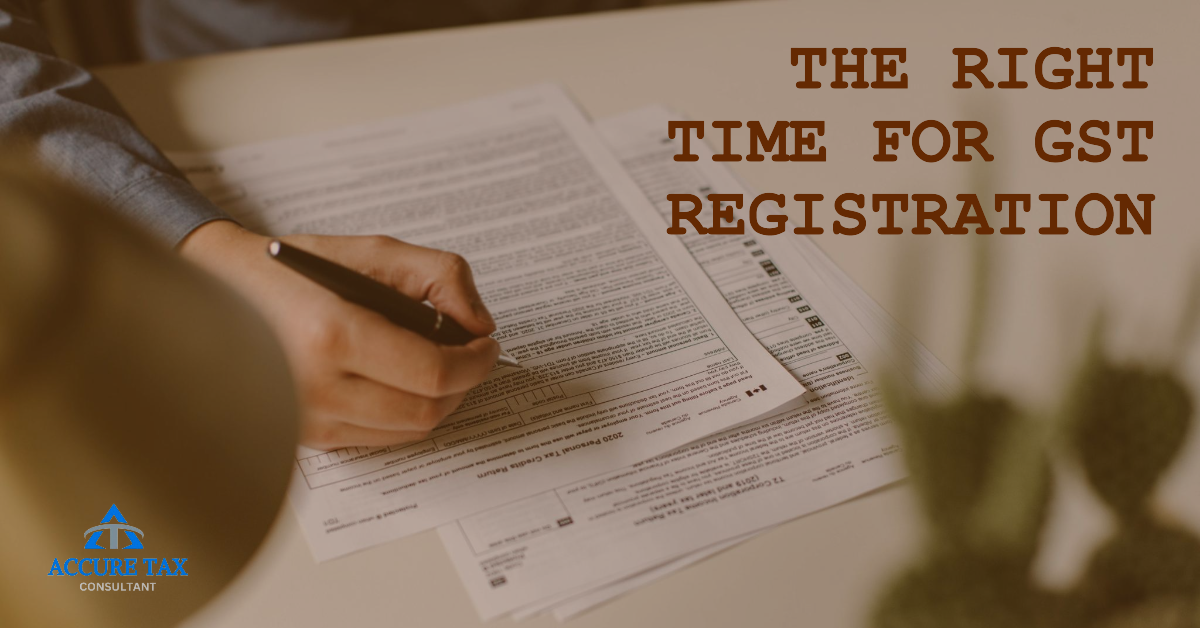
At The Accure Tax Consultant (accuretaxconsultant.com), we understand that navigating the complexities of India’s Goods and Services Tax (GST) can be a daunting task for businesses of all sizes. One of the most common questions we encounter is: “When do I need to register for GST?”
In this blog post, we’ll provide a clear and comprehensive guide to help you determine the right time to apply for GST registration for your business. We’ll delve into the mandatory registration criteria, explore situations where registration is optional but beneficial, and offer additional considerations to ensure a smooth process.
Introduced in 2017, GST is a unified tax system that replaced a multitude of indirect taxes previously levied by the central and state governments. It aims to create a seamless flow of goods and services across the country by eliminating cascading taxes. Registering for GST is essential for businesses operating within India, as it allows them to:
There are several scenarios where registering for GST is not just an option, but a legal requirement. Let’s explore these scenarios in detail:
Example: A bakery operates two outlets in Delhi, each generating a yearly turnover of ₹8 lakh. Since the combined turnover (₹8 lakh + ₹8 lakh = ₹16 lakh) falls below the ₹20 lakh threshold for Delhi, the bakery wouldn’t be mandatorily required to register for GST.
Example: A clothing store based in Delhi receives an online order for a dress from a customer in Mumbai. Since this transaction involves supplying goods across state borders, the clothing store, regardless of its turnover, needs to register for GST.

While registration might not be mandatory if your turnover falls below the threshold and you don’t engage in interstate supplies, there are compelling advantages to registering for GST even as a smaller business. Here are a few important advantages to think about:
Understanding your business’s specific circumstances, particularly your projected turnover and potential for interstate transactions, is crucial in determining the need for GST registration. We encourage you to carefully consider the information presented here and consult with a tax professional at The Accure Tax Consultant (accuretaxconsultant.com) for personalized guidance on GST registration.
By registering at the right time, you can ensure compliance with the law, leverage the benefits of the GST system, and ensure a smooth and efficient business operation. Don’t hesitate to reach out to us – we’re here to navigate the complexities of GST with you!
A: Failing to register for GST when mandatory can attract penalties and legal implications. These may include:
Yes, you can apply for deregistration if your turnover falls below the threshold limit for two consecutive financial years. However, there are certain conditions and procedures to be followed for deregistration. It’s advisable to consult a tax professional for guidance on the deregistration process.
The GST registration process is typically completed within 3-5 working days, provided all the documents are submitted correctly.
Yes, if you are registered under GST, you are required to file GST returns even if you have no sales or purchases during a particular tax period. In such cases, “nil” returns need to be submitted.
A: You can find comprehensive information about GST registration on the official GST portal or by contacting a qualified tax consultant like Accure Tax Consultant (accuretaxconsultant.com).
DISCOVER
PRODUCT
ADDRESS
RZF-110/1, 2nd Floor, Gali No- 40, Main 60 Fit Road, Upper Punjab National Bank, Sadh Nagar-II, Palam Colony, New Delhi -110045
Copyright © 2024 Accure Tax Consultant.